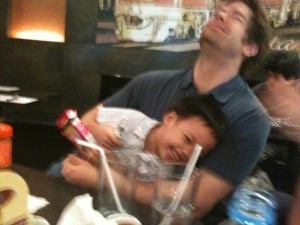Jerry B. Jenkins's Blog, page 38
August 16, 2011
Making Clean POV Changes
Wednesday's Writing on WritingThe story I wanted to tell in Left Behind was so big, I needed another perspective character, someone who could be where Rayford Steele couldn't be. 
While Rayford was home with his daughter or getting back to flying when the air routes were reopened, someone had to be globe-trotting. I needed a pair of eyes in New York, then London, then Israel. It was too much to expect of a pilot (Rayford) without turning him into a comic book hero.
In chapter one, while Rayford is still trying to talk himself into seeing Hattie, we move from the cockpit to first class. And to be sure to keep the reader with me, to show a shift not only in seeing but in perspective, I inserted an extra line space and even added a horizontal line.
There's no secret to changing perspective characters. You must be clear and courteous to the reader, just as you would be to a house guest. I wanted to leave zero doubt in the reader's mind what was going on. My solution in Left Behind, besides the obvious space and line, was to immediately establish the new perspective character:
"Next to a window in first class, a writer sat hunched over his laptop…. At thirty, Cameron Williams was the youngest ever senior writer for the prestigious Global Weekly…"
From this point on, Cameron (Buck) will share the point-of-view load. Until book five in the series, he and Rayford are the only two perspective characters. We go only where they go, hear their thoughts, see what they see. And every time the story switches from one to the other, I made sure to give the reader clear clues.
After several pages establishing Cameron and foreshadowing how events will affect him, I switched back to Rayford with a space and a line. But I wanted it even more obvious than that:
"Not sure whether he'd follow through with anything overt, Captain Rayford Steele felt an irresistible urge to see Hattie Durham right then."
The above reminds the reader of Rayford's internal struggle, but just to be sure the readers could follow the change in perspective, I reverted to whole names again for both him and Hattie. I didn't want my guests wondering what was going on.
August 9, 2011
I'm Without Excuse

 Wednesday's Writing on WritingAs if 360-degree mountain views aren't enough to inspire me when I'm in my writing cave, how about these occasional displays from heaven?
Wednesday's Writing on WritingAs if 360-degree mountain views aren't enough to inspire me when I'm in my writing cave, how about these occasional displays from heaven?
I'm in the middle of writing the book about Christina-Taylor Green, the 9/11/01 baby who was killed at age 9 in the Congresswoman Giffords shooting in Arizona in January. It's called As Good As Imagined (Worthy Publishing), and I'm in the home stretch now. The challenge was researching, interviewing, organizing, and then virtually doing all the writing in a matter of weeks.
August 5, 2011
Easiest Free Book Contest Ever!
Email me at [email protected] and be among the first 50 to promise to read the Advanced Reader Copy (ARC) of my latest novel, The Betrayal, and review it in as many social media outlets as you can without giving away the identity of the betrayor. Include your address and I'll send you the ARC. Then, when you send me evidence of your reviews, which must appear before the end of this month, I'll send you an autographed hardback of the book as soon as it's released September 1.
August 2, 2011
What's Your Point?
Wednesday's Writing on Writing
 I like movies that are not afraid to be quiet. The film adaptation of John Irving's The Cider House Rules was a master-piece, which I confess despite the fact that it was a pro-abortion bromide and my personal philosophy is diametrically opposed to its message. Why? Because as opposed as I am to abortion, Irving deserved his Academy Award, and I applauded his acceptance speech, wherein he made clear his worldview. He didn't pretend he didn't have a message.
I like movies that are not afraid to be quiet. The film adaptation of John Irving's The Cider House Rules was a master-piece, which I confess despite the fact that it was a pro-abortion bromide and my personal philosophy is diametrically opposed to its message. Why? Because as opposed as I am to abortion, Irving deserved his Academy Award, and I applauded his acceptance speech, wherein he made clear his worldview. He didn't pretend he didn't have a message.
And neither should Christian writers. Ours is a message of hope, of reconciliation, of forgiveness. True art will communicate that without preaching. Give the reader credit. Tell a story and assume he gets it.
If the Left Behind books, The Prayer of Jabez, The Purpose-Driven Life, and others have awakened the general market to the vast potential of inspirational titles, the horizon has been broadened for us all.
The toughest challenge for any artist, any creator, is to resist the urge to show off. Our name will be on the cover, after all, and we'd love to remind the reader with a turn of phrase or a choice word that yes, I'm the one fashioning this message.
But the best writers, like the best composers and painters, know that it is not about them. It is about the art, the content – and anything that interferes with the connection between that and the viewer, listener, or reader is an interruption.
If your reader is aware of your technique, he may miss your message. If the pianist dazzles his audience with technique, the purpose of the composer may be compromised. If the appreciator of art becomes aware of the brushstrokes, the artist may lose his ability to reach the soul through the meat of his message.
A true classic transports you. You're unaware of the performance and the performer, the author and his technique. As creators, that should be our goal. Not to write classics. That's not up to us. The market will decide that. But to get out of the way so the heart of the message reaches the soul of the reader.
Accomplish this by writing clearly and concisely, enticing your readers and guiding them to the core of your work. Use words they will understand rather than ones that will make them wonder. Get out of the way of your art.
July 30, 2011
Max Finally Where He Belongs
What a thrill to visit son Dallas and daughter-in-law Amanda's home in Illinois where they have finally added Max (a four-year-old from Bangkok) to their homegrown brood of (from left) Sam (10), Elle (6), and Maya (8).  The paternal grandparents are called Boo and Ya in Thai. After Dianna and I had visited Max is the orphanage in Bangkok in January, we had been told that he had asked for Boo and Ya every day since. We thought they were exaggerating to make us feel good.
The paternal grandparents are called Boo and Ya in Thai. After Dianna and I had visited Max is the orphanage in Bangkok in January, we had been told that he had asked for Boo and Ya every day since. We thought they were exaggerating to make us feel good.
Well, I got to Illinois a couple of days ahead of Dianna, and when I appeared, Max pointed and said, "Mommy! Boo!" Then he dramatically spread his arms and said, "Ya?"
Within a day he realized the other kids were calling me not Boo but Grandpa. We played a game where I would point at myself and ask if I was Daddy or Mommy or Sam or Maya, etc., and he would laugh and shake his head and say "No!" I finally got to "Boo?" and he'd do the same and say, "No! Grandpa!"
I believe he learned a couple of dozen more English words while we were there.
July 26, 2011
Writing from Your Passion
 Wednesday's Writing on Writing
Wednesday's Writing on Writing
From the age of eight, I just knew I was going to be a big league baseball player. That dream became my whole life. Baseball was my god. I ate, drank, and slept baseball. It invaded my dreams.
I would probably never have picked up a pen if I hadn't been such a sports nut.
The Little League baseball team I played on finished fourth in the state (Michigan) in 1961 and then first in 1962, and we missed going to Williamsport, Pennsylvania, for the Little League World Series by one game. The team that knocked us out of the tournament went on to finish second in the world. I still remember most of the details and the score of every game. That's how we fanatics are.
Before I explain how sports led me into writing, let me assure you that you don't have to be a sports fan to get something out of today's blog. The point is that I turned one passion into another, and you can too. My first seventeen or eighteen books were nonfiction, many of them as-told-to autobiographies of sports stars, and those grew out of my background as a sports writer.
As you've probably noticed, people who try to write about your area of interest without really having a background in it can never really do justice to the subject. That's why you so often hear that you should write what you know. If I had attempted aviation writing, pilots would have seen through every detail. When I read sports books, I can tell within one page whether the writer has a clue.
What's your passion? Your strength? What field do you really know? Write about it. Fashion a short story, write a poem, interview a leader in the field, or work on a novel. Put yourself and your interests into it.
If writing is hard work, becoming recognized as a writer is even harder. Writing about something you know little about will make it only drudgery. Specialize—especially during your formative writing years—in your own area of interest. That will help you when the writing comes hard and the only thing keeping you at the keyboard is the dream of success.
July 19, 2011
Dialogue Writing Hints
 Wednesday's Writing on Writing
Wednesday's Writing on Writing
One of the clichés of writing conversation is feeling the need to explain more than once what's going on, as if the reader can't figure it out on his own. I actually read a novel in which, when a character said something quirky like "Promptly, punctually, and prissily" (which was actually funny and fit the personality), the author felt the need to add, "he said alliteratively." Sure glad that was clarified.
Other writers have a character respond to a diatribe from another with "Yep," or "Nope," or a shrug. Perfect. I love to learn about personalities this way. The character is a man of few words. But too often, the author intrudes, adding, "he said, eschewing small talk." Yeah, we got that.
If you create a character who backs into a conversation with tentative phrases like "Oh, I was just wondering…" or "I don't know how to say this, but if I, well, let me say it this way…" we get it. We understand this is a timid, nervous person, afraid of saying something wrong, sensitive to others' feelings. Avoid the temptation to explain. Don't follow that with, "she began nervously, unsure how to broach the subject."
Maybe the responder to that speaker says, "Is there a question in there somewhere? What are you saying?" That tells us all we need to know. You don't have to explain by adding, "the insensitive jerk said."
Listen to people express themselves. Note cultural similarities and distinctive characteristics. Is the husband an old-school patriarch, or henpecked? See how the subjects behave differently based on how comfortable they are expressing themselves or sharing family secrets. Television documentaries capture foreign dialogue, showing how people of other cultures speak. The mall, church, a public gathering—all can become your listening and evaluating laboratories.
My favorite advancement in the writing of dialogue—though I admit it is slow in taking hold—is the realization that the word asked is almost always redundant: "'Where's the dog?' he asked." The sentence of dialogue is interrogative, and it ends with a question mark. Is it not redundant to add "he asked"? I never use asked in attributions any more: "'Where's the dog?' he said."
That's all you need. Yes, it occasionally jars readers. Sometimes editors will even start changing said back to ask until they realize I've been so consistent with it that it must be on purpose. More and more writers are replacing ask with said, and to me it only makes sense.
As you rewrite and polish, read your dialogue aloud and listen for problems with cadence. Your editor—and your reader—will be glad you did.
July 12, 2011
Detail, detail, detail
Wednesday's Writing on Writing
Here's a problematic phone scene, from an unpublished manuscript:
The tinny ring echoed through the dark house. The shiny white receiver waited on the stone countertop. Another outburst. Chester, handsome, dark- "Hi, Chester. It's Mary."
"Hi, Chester. It's Mary."
You get the idea. Here's my version:
Late that night, Mary phoned.
Give the readers credit. If you tell them Mary phoned Chester, they can assume Chester heard the ring, stood, moved to the phone, picked it up, and introduced himself. You'd be amazed at how many manuscripts are cluttered with such details.
Even in a period piece in which the baking of a cake from scratch is an engrossing trip down memory lane, the good writer gives readers credit for thinking. While she may outline all the steps the heroine goes through to make the cake, she will avoid having her rise and stride to the kitchen or even pull open the oven door – unless there's something about that oven door novel enough to include. If the character has to use a towel to lift the iron lid, fine. But if she does that, we know she had to stand and walk first.
Skip the recitals of ordinary life. We all get dressed, walk out to the car, open the door, slide in, turn the key, and back out of the driveway. If your character backs into the garbage truck, that's a story. Just say it:
"That morning, as Bill backed out of the driveway, his mind was on the tongue-lashing he had endured the day before from his boss. Only when he heard the ugly crunch and scrape and his head snapped back did he realize he had not bothered to check his rearview mirror. He had plowed into a garbage truck that looked half as big as his house."
July 5, 2011
Early Breaks
 Wednesday's Writing on Writing
Wednesday's Writing on Writing
One of the greatest gifts my parents ever gave me was a subscription to Sports Illustrated. I've read it religiously for decades, and I read the sports page every day as a kid too. Some of the best writing published has been found in S.I. I could hardly have had better instructors.
After a football injury I started covering our high school's games for a local newspaper. My parents had to drive me to the games, then to the < newspaper office, where they sat waiting for me in the parking lot as I fashioned my stories for a dollar per printed inch of copy.
< newspaper office, where they sat waiting for me in the parking lot as I fashioned my stories for a dollar per printed inch of copy.
I almost immediately realized I had found my niche. While my early articles were painfully amateurish, I did have a certain flair and bent towards sports writing, because of all my reading and my passion for the games.
I healed in time for baseball in the spring, and I eagerly returned to what I considered the center of my life. But then I injured my knee, and this was before the advent of reconstructive surgery. While it took a long time to admit or accept it, any future I might have had in baseball was gone.
That injury finally shook my life back into balance. I was a Christian but had put baseball far ahead of even my faith. Now I understand that I had to forfeit the game I loved to put God back in his proper place in my life – but giving up my dream caused deep pain.
Setting my sights on a career in sports writing assuaged some of the sense of loss. But God had a better idea, as He always does. Forty-five years and a whole bunch of books later (many of them on sports), my aim is to teach others to write.
If you're ready to try, consider what we have to offer at www.ChristianWritersGuild.com
July 1, 2011
We Finally Get Max!
Son Dallas and daughter-in-law Amanda have been trying to adopt Max, a four-year-old Thai, for three years. Dianna and I got to meet him first, when we visited his orphanage in Bangkok in January. He a charming little doll, and we were smitten immediately.
Dal and Amanda are finally there now, and he's captured their hearts as his photo alone had done years ago.
I find myself using the Yiddish term verklempt these days (Google it), as we wait for him to finally be home where he belongs. Dianna and I will see him again, this time in Chicago, in a couple of weeks. And we can't wait.
His brother Sam, 10, and sisters Maya, 7, and Elle, 6, are ready to welcome Max.
Best of all, our missionary friends – Chuck and Krissie Cilano – have been so instrumental in making this happen that Dallas and Amanda have given Max their last name as his middle name. As you can imagine, they were blown away.
Anyway, rejoice with us as we welcome this precious new grandson, Max Cilano Jenkins. Here he is with his new Mom and Dad and laughing with Dad.





